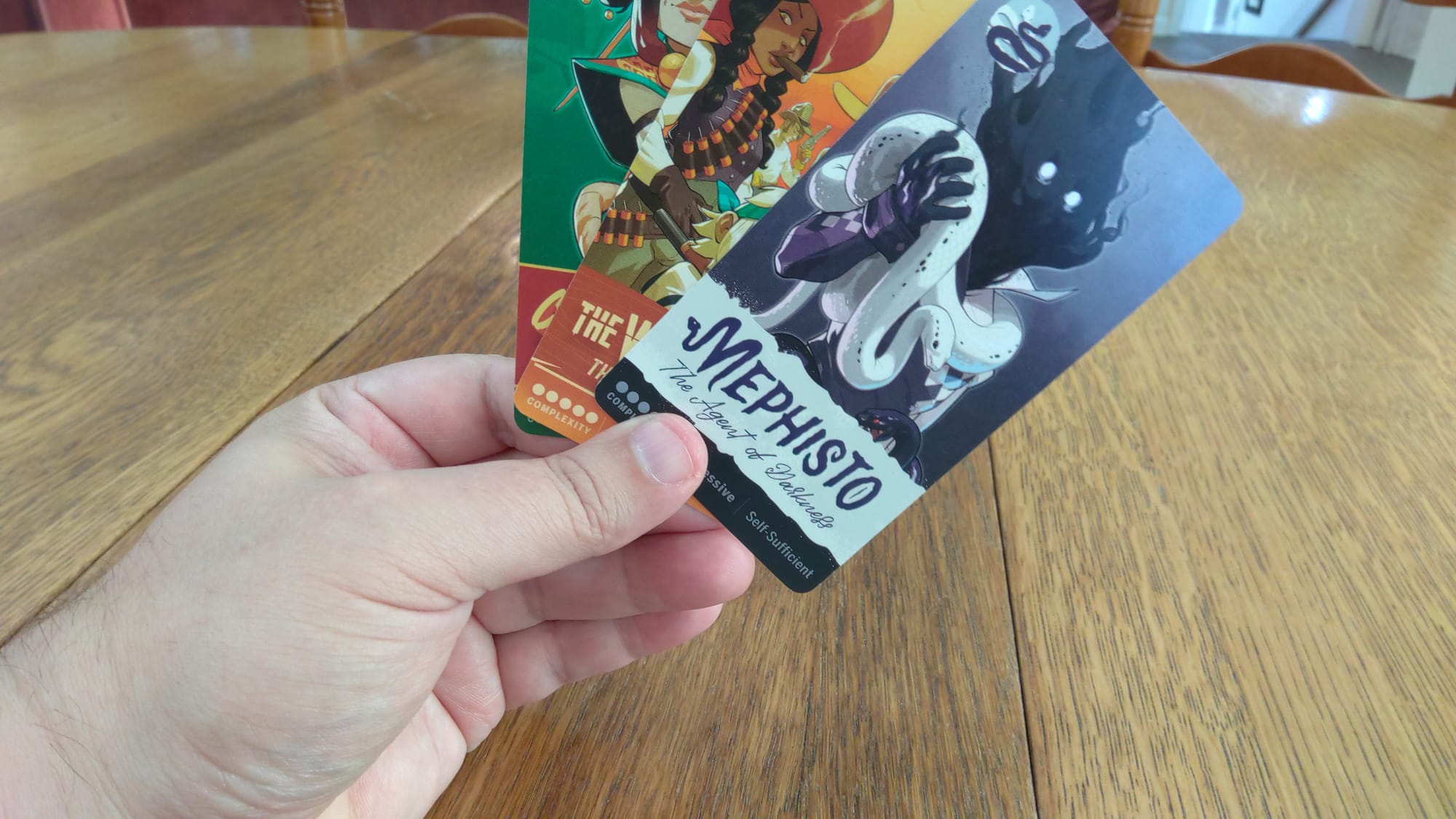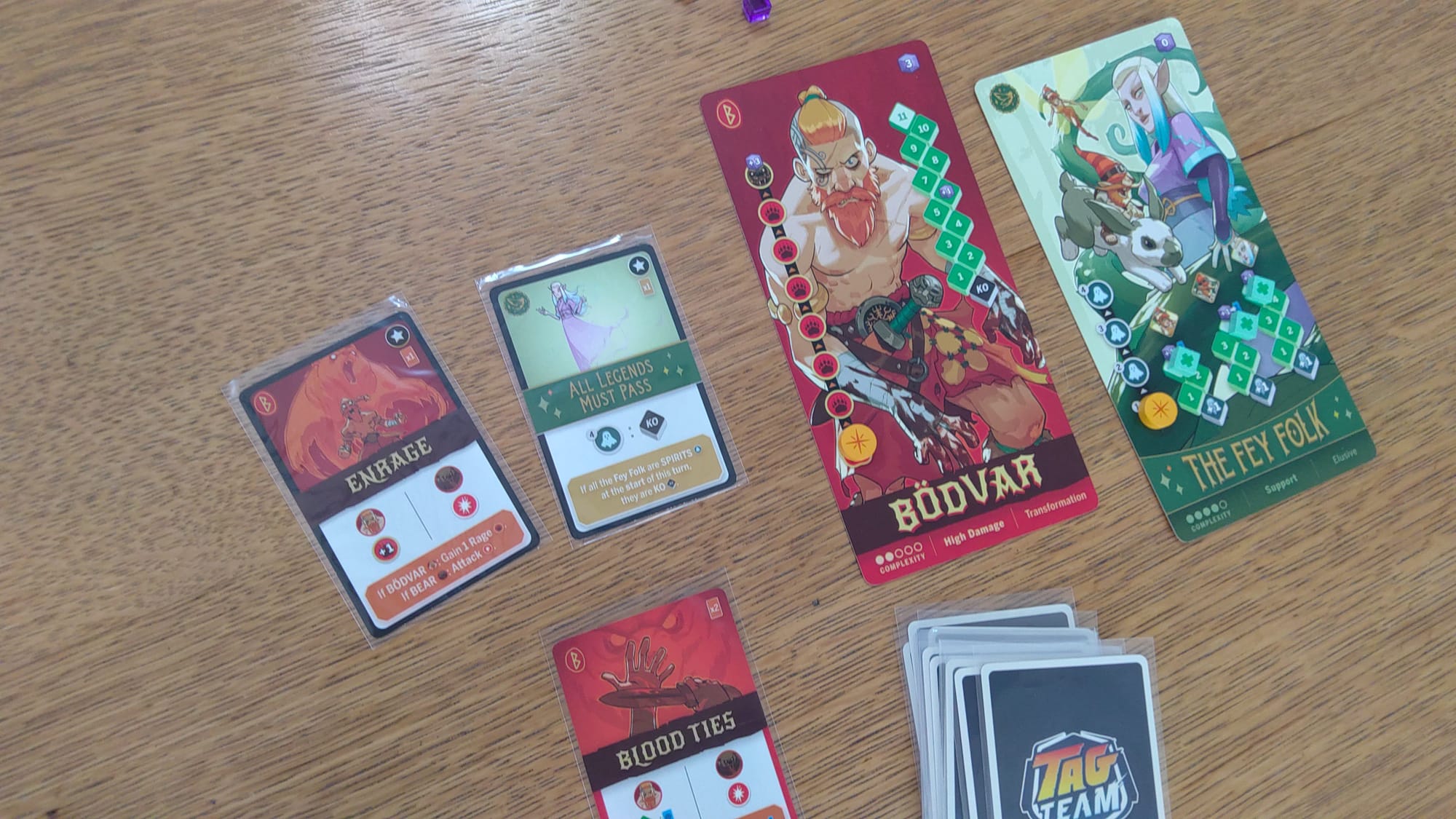I'm partial to Vs fighters, probably due to a combination of what my friends had copies of and the only decent cabinet around me growing up was a Marvel Vs Capcom 2 in the lobby of the local waterpark. Tag Team started off in my good graces because it replicates the managed chaos of those games while being much more approachable, at least a little bit on account of not having to learn the movesets of 60-something characters.
Games of Tag Team start as all matches of these sorts of games do, by assembling your teams. For the basic draft, you'll deal all the draft cards out to both players, pick one, pass the remainder, and pick your other character after revealing your initial picks. After your first couple games, I'd recommend using the competitive variant that gives players an additional ban from their initial deal. It's nothing too dramatic, but it adds a splash of strategy, and I always feel a little more comfortable committing to Bridgit or the Fey Folk if I can keep my opponent off Mordred.

Once you've chosen your characters, you set up their boards, slap their starter cards together to make your fight deck, and finally shuffle the rest of their cards (the only shuffling you'll do all game) to make your build deck. Running your fight deck is as straightforward as gaming gets: you'll both simultaneously flip the top card and resolve it. There's generic attacks, which simply do damage equal to your power to your opponent’s active character, and blocks, which will put an end to such horseplay. Of course, there's usually extra effects layered on top, and cards that are purely special effects. Once you've run through your full deck, you'll draw 3 from your build deck, pick a card to add in, and drop the other 2 onto the bottom of your build deck. It's certainly a minimal amount of decision space, and certainly nowhere near as crunchy as me and Andy's other favorite cardboard fighters, but the amount of impact attached to decisions as quick as which card you choose and where you slot it in your deck is the first thing that makes Tag Team magic. Of course you'll want to match your blocks with their attacks, and try to focus your attacks on one character so you can KO them and win or whatever, but that's the surface level where I could play this with a child; the real juice comes from shifting parts of your deck by adding your fresh cards in the right spots. It was when I drew a handful of blocks early, before my opponent had added a single attack to their deck, that I fell in love. I had to decide which of my characters was most likely to (at least eventually) get attacked, and decide which of their cards my opponent was most likely to attack. Most games ask you to make the best of suboptimal situations, but how Tag Team does it with little to no frills opens up my favorite decisions in board gaming to anyone, and that's what I'm here for.

Elephant in the room time: yes, there is a level of Tag Team where the person with the better memory has the upper hand. I've definitely lost games because my brain is a frittata. On top of that, since adding cards to your deck is simultaneous, a jackass could delay adding their card to pay attention to where their opponent did so and use that to inform their decision. But I'll fall back to my default of not letting how easy it is to cheat in a game alter my view of it, and continue to recommend just not giving the people who would take advantage of such the space in your life.
To end on a happier note, since we tapped it for our best of Gen Con, I've had the time of my life trying out different character combinations (save yourself the heartache of Bödvar+Golem), and given the sword in the stone 2026 teaser in the box, you can feel safe knowing there's more coming.
Tag Team
Excellent
Tag Team might not be perfect, but when a game is otherwise this good and light, I'm perfectly willing to overlook a minor fault here or there.
Pros
- I've never played a fighting game with this breadth of approachability
- All the characters feel different
Cons
- A bit of memory/recall dependence
- Someone could cheat rather easily if they wanted to
This review is based on a retail copy provided by the publisher.





















